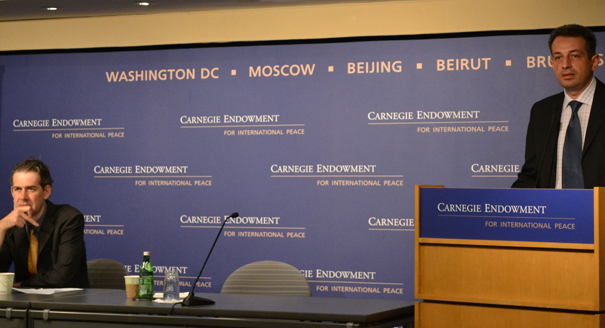Registration
You will receive an email confirming your registration.
IMGXYZ3869IMGZYXUkraine continues to seek a course between full integration with both the West and the East. In the run-up to parliamentary elections in October and Ukraine’s 2013 OSCE chairmanship, what are Kyiv's foreign policy objectives and how will U.S.-Ukraine relations evolve?
Ukraine’s newly appointed Deputy Foreign Minister Andrii V. Olefirov discussed the current state of foreign policy in Ukraine. Carnegie’s Thomas de Waal moderated.
The Current State of Foreign Policy in Ukraine
Ukraine has recently celebrated the 20th anniversary of diplomatic relations with the United States, said Olefirov, adding that US support strengthens democratic statehood in Ukraine. The potential of bilateral trade and commercial investment between both countries remains high.
- European Union Membership: Ukraine remains dedicated to the goal of eventual EU membership, stressed Olefirov. On July 23 the Minister of Foreign Affairs of Ukraine, Kostyantyn Gryshchenko, signed amendments to the Agreement on Visa Facilitation between the European Union and Ukraine, simplifying the visa process for many Ukrainians. Olefirov added that visa-free agreements with the EU are extremely important to civil society in Ukraine, supporting people-to-people relationships, and basic freedoms of movement.
- NATO Cooperation: Partnership with NATO remains a high priority for Ukraine, said Olefirov, adding that Ukraine is the only non-member country that participates in all NATO led programs. Ukraine is dedicated to nuclear nonproliferation, Olefirov explained. They have demonstrated this commitment by eliminating stockpiles of highly enriched uranium, fulfilling an agreement in 2010 at the Washington Nuclear Security Summit.
- Russian Partnership: Ukraine is closer to the European Union than to Russia, argued Olefirov, but as a close neighbor, Russia will always be an important partner. Instead of full membership of the Customs Union of Russia, Belarus and Kazakhstan, Ukraine is proposing cooperation in a 3+1 format. Highest priorities in bilateral negotiations between Russia and Ukraine include energy issues, border issues, and ongoing Custom Union discussions.
- OSCE Chairmanship: In 2013, Ukraine will assume the chairmanship of the Organization of Security and Cooperation in Europe (OSCE). Olefirov said the challenge of the chairmanship is enormous, but positive, and extremely important for Ukraine. Progress in the peace settlement in Transnistria remains a high priority, said Olefirov. Ukraine will continue to support the 5+2 format in Transnistria, and will work towards re-establishing railway communication in the region. Another priority for Ukraine’s 2013 chairmanship is a plan to host a special energy forum, promoting energy security and energy sustainability, added Olefirov.
Domestic Politics and Foreign Policy
- Elections: On October 28, Ukraine will have parliamentary elections and a chance to demonstrate transparency to the international community, said Olefirov. Domestic and international organizations are registering with Ukraine to monitor the elections. Legislation has been passed to improve the state of election transparency, and webcams have been posted at election sites providing a live feed to internet users. Asked to comment on recent legislation on language and on homosexuality, Olefirov said, “As a person I would comment,” but said it would be inappropriate to give a verdict as a minister.
- Energy Independence: One of Ukraine’s highest priorities in domestic politics is energy independence, said Olefirov in response to a question about Chevron investments in shale gas exploration. Olefirov argued that Ukraine needs to diversify its energy sources because it currently pays 22% more for gas than France and Germany. Ukraine’s goal is to diversify its energy by exploring new resources. Chevron was awarded a tender to explore recently discovered shale gas in Ukraine, and as Olefirov points out, Ukraine will be awarding other tenders soon.
- People-to-People Relationships: Olefirov stressed the importance of people-to-people connections, which encourage healthy diplomatic relationships between countries. One way Ukraine is trying to implement this policy is through visa-free regimes. Olefirov hopes that a visa-free regime could be established in the future between the United States and Ukraine.
